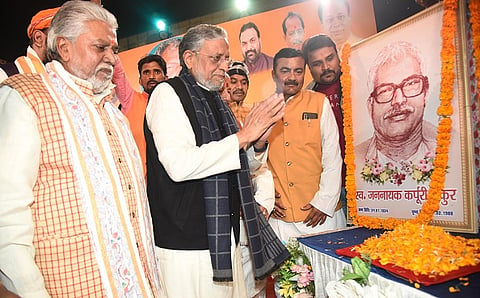As the Central government decided to bestow Bharat Ratna on former Bihar Chief Minister and pioneer of layered reservation Karpoori Thakur, the social engineering politics of the Bharatiya Janata Party (BJP) has apparently taken a new turn. Coming at a time —just months before the Lok Sabha elections— when the opposition alliance is trying to bank on the promise of caste census, political observers think the selection of an extremely backward class (EBC) leader could be a political masterstroke.
When Bihar CM Karpoori Thakur Made Urdu Second Language
Former Bihar Chief Minister Karpoori Thakur promoted Urdu as a second language in the state and called for its acceptance in courts and ordered signboards to be made in Urdu as well.
Notably, Thakur as a CM from the marginalised community for the first time implemented the layered reservation of 26 per cent that included 12 per cent of other backward classes (OBCs), 8 per cent EBCs, 3 per cent women, and 3 per cent economically backward upper castes. The Jana Sangh, the parent organisation of the BJP, nonetheless, strongly opposed it. It also led to the fall of his government in 1978.
However, this is not the only time that Thakur actually irked Jana Sangh.
It was 1967 and an uneasy coalition of Jana Sangh and CPI came to power in Bihar. Mahamaya Prasad became the CM and Thakur his deputy. He, however, got the education ministry. His deep connection with social justice politics made him realise the importance of vernacular language in social mobilisation. To achieve this goal, firstly, he dropped English as the official language of communication.

A report of India Today from 1977 notes, “Consequently, all English typewriters were removed from the secretariat, English abolished from schools and colleges, and a new system —‘pass without English’— came into vogue and was made optional in the Bihar Public Service Commission. Karpoori Thakur, the then deputy chief minister and education minister, spearheaded the anti-English campaign.”
If this move was in line with Sangh’s idea of Hindi nationalism, the next one annoyed them the most. In 1967, when the coalition government was formed, the archival reports as accessed by Outlook show that there were 33 proposed programmes. One of them was making Urdu the second language of the state. As per the records, on March 17, 1967, the Governor even referred to it during his speech. However, the report of the Raghubar Dayal Commission (enquiry commission formed post-Ranchi riots) points out that Sangh opposed the proposition tooth and nail but “was given liberty to oppose it anytime”.
The discussions to declare Urdu as the second language of the state were reportedly not held in the cabinet. But Thakur released a circular, as accessed by Outlook, with the following directions:
In all government offices (excluding courts) all letters, applications, petitions etc. in Urdu should be accepted and their replies, also be given in Urdu, as far as possible.
All important government publications should possibly be translated to Urdu and
That all government signboards be also written in Urdu besides Hindi
This incidentally was followed by a non-official bill tabled by Congress member Nasiruddin Hyder Khan on July 14, 1967. This bill led to massive brouhaha in the assembly and Jana Sangh declared protests across the state between August 12-26.
Sangh during this time distributed some handbills mentioning that they would prevent the country “from going into the claws of Pakistan; that the question of language which had led to the Partition 20 years ago had been raised by some Pakistani and anti-national forces”. Such evocation of communal sentiments led to massive riots in Ranchi that killed more than 150 people.
Since 1984, though Urdu has been officially the second language of the state, the condition of Urdu medium schools is seemingly miserable. Media reports from 2022 suggest that Bihar has 2,600 Urdu medium schools and 72,663 government schools have Urdu as a language. But from 2005, the Bihar government has only recruited 32,000 Urdu teachers.
Since coming to power, there have been several instances where the ruling party MLAs and MPs were found criticising Urdu for its cultural connection to Indian Muslims. In 2023, BJP MLA from Maharashtra Mihir Kotecha opposed the construction of Urdu Bhawan in Byculla, Mumbai. He accused the then CM Uddhav Thackeray of practising ‘appeasement politics’.
Last year, another BJP MLA Sunil Kumar while criticising the decision of the Karnataka government to hold an Urdu poetry session during Dussera said, “The state government has organised an Urdu poetry conference on Nadhabba Dasara. Why the imposition of Urdu in Dussehra, which was supposed to be a platform for the display of Kannada's rich culture? Congress is imposing Urdu on Kannada to please its vote bank.”
So, while PM Modi showers praise on Thakur, the question comes, will the ruling party own Thakur’s decision to promote Urdu as a Hindustani language?
BJP MP Sushil Kumar Modi pay tribute to former Bihar Chief Minister Karpoori Thakur on his birth anniversary on January 24, 2023 in Patna, Bihar.